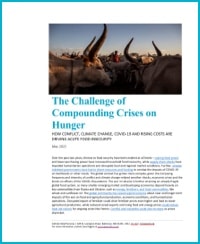
Policy Brief | The Challenge of Compounding Crises on Hunger
Over the past two years, threats to food security have been evident at all levels – soaring food prices and lower purchasing power have increased household food insecurity, while supply chain shocks have impeded humanitarian operations and disrupted local and regional market conditions. Further, already indebted governments have had to divert resources and funding to combat the impacts of COVID-19 on livelihoods or other needs. The global context has grown more complex, given the increasing frequency and intensity of conflict and climate change-related weather shocks, economic crises and the knock-on effects of the COVID-19 pandemic. The war in Ukraine is further straining an already fragile global food system, as many smaller emerging market and developing economies depend heavily on key commodities from Russia and Ukraine, such as energy; fertilizers; and food commodities, like wheat and sunflower oil. The global community has raised urgent concerns about near and longer-term impacts of the war on food and agricultural production, economic conditions, and humanitarian operations. Disrupted export of fertilizer could drive fertilizer prices even higher and lead to lower agricultural production, while reduced cereal exports and rising food and energy prices could reduce food aid rations for ongoing crises like Yemen. Conflict and instability could also increase as prices skyrocket.
These challenges continue to beleaguer some of the world’s poorest countries, where people tend to be more dependent on food imports, and households must devote up to half of their total expenditures on food. Surging energy, transportation and food costs are lowering household purchasing power and worsening food security outcomes in many countries. The World Bank forecasts most commodity prices will remain higher this year and could continue to be elevated through 2024, which could have devastating consequences on the poorest households. Higher prices also constrain humanitarian operations; because of rising fuel costs and food prices, USAID’s purchasing power for food commodities has dropped 11.4 percent in one year, which could lead to 10 million fewer people reached by U.S. government food assistance. Further, many humanitarian situations across various countries remain underfunded, whether from donor fatigue; cessation of support, such as in Sudan; the liquidity crisis in Afghanistan; or diversion of resources from ongoing, ‘lower profile’ crises to more recent ones, like Ukraine. As such, increased commitment, coordination and contextually appropriate responses with a focus on building food systems’ resilience are urgently needed to prevent the cycle of food crises.
Recommendations:
In response to the worsening food security situation around the world and based on our experiences responding to acute food insecurity needs, CRS provides the following recommendations to relevant stakeholders.
In the near term, to provide a robust and rapid response to combat rising food insecurity around the world:
-
The administration should allow for response modalities that are most effective for the local context and market conditions, whether in-kind assistance, cash and voucher assistance, local and regional procurement, or mixed modalities. Additionally, the administration should:
- Provide clear guidance for Missions and field offices to avoid delays and support changes in project activities;
- Include buffers for programming costs given the potential volatility in food and energy prices; and
- Enhance and/or scale up market monitoring infrastructure and knowledge sharing opportunities.
- The President or Secretary of Defense should grant the waiver for current U.S. cargo preference requirements through February 2025 to alleviate increasing ocean freight costs that have financially constrained international food aid programs over the years but have risen even further because of the war in Ukraine.
- The administration should increase funding to local actors to carry out responses to acute food crises and meet the needs of local communities. Local actors have been shown to provide for people’s needs more holistically, rather than siloed by sector or along the humanitarian/ development divide.
Longer term, to address root causes of hunger and strengthen the inclusiveness, resilience and sustainability of the global food system:
- The administration should further invest in strengthening local production of diverse, nutrient-dense food sources using climate-smart approaches and supporting agri-food systems to diversify food supply, decrease reliance on food imports and minimize interruptions to food chains.
- The administration should streamline and accelerate approval processes to use seeds for food security activities funded by BHA to help scale up agricultural activities in response to food crises.
- The administration and other multilateral organizations should fund and scale up social protection mechanisms to protect the most vulnerable households against the effects of shocks and stressors on food security, such as cash transfers, vouchers, and school feeding programs. These should be complemented by graduation programs to help participants diversify their assets, minimize negative coping strategies and support local economies.
- The administration should continue to target the most vulnerable to food insecurity, such as those forcibly displaced, women and children, people with disabilities and the elderly; and address fragility and conflict by integrating social cohesion and peacebuilding into food security programming, as feasible.
- The administration should work with global systems and multilateral structure to advocate for debt cancellation for poorer countries that are struggling with food import bills and COVID-19 related spending to prevent them from falling into further economic crises. Similarly, efforts to reduce food-related restrictions during food crises can allow markets to flow and thus get food to those who need it most. We also encourage the administration to influence the World Trade Organization to strengthen global trade rules to stop export restrictions and take the necessary steps to update the WTO rulebook on agriculture. Exceptions should be made for countries that face their own food security crises.
Published June 2022
For more information, please contact [email protected].


